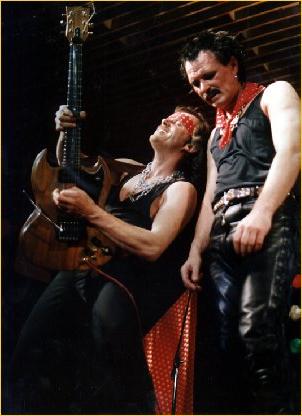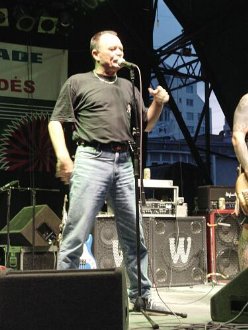 Beatrice
was originally formed in 1969 as a female rock band (the first such in
Hungary) covering popular songs like "House of the Rising Sun" from The
Animals. The lineup changed several times until the mid-1970s when the
constant lineup became: Mónika Csuka (vocals, guitar); Katalin
Nagy (keyboards); Kriszta Hamar (bass guitar) and Mária Csuka
(drums). No record of any form was made by this formation.
Beatrice
was originally formed in 1969 as a female rock band (the first such in
Hungary) covering popular songs like "House of the Rising Sun" from The
Animals. The lineup changed several times until the mid-1970s when the
constant lineup became: Mónika Csuka (vocals, guitar); Katalin
Nagy (keyboards); Kriszta Hamar (bass guitar) and Mária Csuka
(drums). No record of any form was made by this formation.In 1976 singer Feró Nagy, the husband of Mónika Csuka joined the band. In 1977 Katalin Nagy and Kriszta Hamar left Beatrice. Feró invited guitarist Sándor Bencsik and bassist András Temesvári. With this lineup the band scored mostly disco songs which were highly popular at the time. Their biggest hit was the song "Gyere, kislány, gyere" ("Come, girl, come") which popularized disco and won a radio song contest in the same year. In 1978 Beatrice disbanded, leaving Feró alone.
Feró created a whole new band in 1979 with the same name, but with nothing else remiscent for the previous lineup and style. Beatrice played punk rock music, being the first band in Hungary. Their music were cheap and aggressive. It was against the Socialist system and became highly popular, mostly among the working class young people. It was a unique Hungarian version of punk using folk elements. Feró was the absolute frontman, usually making comical and/or aggressive monologues or performances on stage calling himself "A Nemzet Csótánya" ("Roach of the Nation"). He became a "phenomenon" along with the band.
The original line-up were: Feró Nagy (singer, frontman and songwriter); László Lugossy (guitar); Lajos Miklóska (bass guitar); and Tibor Donászy (drums). With this lineup Beatrice released several successful singles like "Nagyvárosi farkas" ("Big City Wolf"), "Beatrice Blues" and "Jerikó" ("Jericho"). Although (just like other punk bands around the world) they were mostly a concert-band. Their first album was banned by the government and was released only in 1993.
As the influence of Beatrice the Hungarian version of punks appeared calling themselves "csövesek" ("hoboes") wearing a black leather jacket with ragged jeans and a traditional Hungarian red-white polka dotted head scarf. The government was - of course - very upset and against Beatrice's activity. They created hoaxes like Feró chopping down and eating the heads of living birds (a lá Ozzy Osbourne) and doing other Pagan rituals on stage. The result was that more and more young people became curious about their concerts.
In 1980 they made a successful concert with fellow bands Omega and LGT which was recorded and released as an LP. In the same year Lugossy left the band. His substitues were guitarists József Vedres and Csaba Bogdán. A keyboard player László Waszlavik also joined Beatrice. In 1981 Beatrice disbanded. Feró and József Vedres formed a new band called Bikini.
After a six years hiatus Beatrice was reunited in 1987 with the lineup of Feró Nagy (vocals); László Lugossy (guitar); Lajos Miklóska (bass guitar); Tamás Zsoldos (guitar) and Bertalan Hirlemann (drums). They released a successful "greatest hits" LP also containing new recordings. In 1990 they released their first studio album "Gyermekkorunk Lexebb Dalai".
In 1991 László Zsenecz (bass) and Zoltán Pálmai (drums) replaced Miklóska and Hirlemann. Zsoldos also left the band. They scored their most famous and successful album "Utálom az egész XX. századot" ("I hate the entire 20th Century") which led the Hungarian record sales list for 38 weeks. They made several successful tours and another album in 1992. Also several lineup changes occurred in 1992 and 1993. They were named as "The Most Successful Rock Band of '92" by MAHASZ.
During the last half of the 1990s the entire lineup except Feró was changed. They released two albums in 1996 and 1999. They still doing concerts and tours around Hungary, mostly playing their classic hits. In August, 2005 Beatrice performed on the Sziget Festival rock fest.
The current lineup is: Feró Nagy (vocals); József Vedres (guitar); László Brúger (guitar); László Zselencz (bass guitar) and Gábor Németh (drums).
 1978 elején indult a híres-hírhedt
1978 elején indult a híres-hírhedt